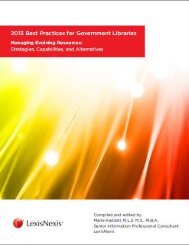2012 Best Practices for Government Libraries
2012 Best Practices for Government Libraries
2012 Best Practices for Government Libraries
You also want an ePaper? Increase the reach of your titles
YUMPU automatically turns print PDFs into web optimized ePapers that Google loves.
39<br />
BEST PRACTICES <strong>2012</strong><br />
students need to have with current technology, but also a willingness and drive to<br />
continue to learn and stay up with new and emerging technology (Weldon, <strong>2012</strong>).<br />
Through a survey on business professionals being computer savvy, it was<br />
found that the work-ready college graduate may not know how to code but they<br />
would be able to troubleshoot and problem solve technological errors. This<br />
troubleshooting and problem solving would translate into a work-ready individual<br />
who could understand what computers could do and what software to download to<br />
help them with work-related tasks (Weldon, <strong>2012</strong>). Work-ready individuals would<br />
understand impacts of emerging technologies and attitudes, behaviors and needs of<br />
in<strong>for</strong>mation users (Weldon, <strong>2012</strong>).<br />
The Study<br />
The nature and purpose of the study was to determine if college graduates<br />
were work-ready. This was examined through the skills of a computer savvy<br />
individual. Computer savvy was defined as one emergent theme to analyze <strong>for</strong> this<br />
study. The research design is qualitative purposive sampling by selecting groups of<br />
individuals based on college degree and computer savvy com<strong>for</strong>t level (Patton,<br />
2002). Computer savvy levels would show the work–ready level of college<br />
graduates (Weldon, <strong>2012</strong>).<br />
The survey was conducted from April 19, 2011 to April 20, 2011. The<br />
population were 89 business professionals who worked in libraries, associations,<br />
government agencies, law, and health sciences sectors. The lowest degree was a<br />
high school diploma while the highest degree was a doctorate. The participants<br />
came from 26 states and four countries. The survey was created through Survey<br />
Monkey and the link was sent to the following listserves: Society <strong>for</strong> American<br />
Archivists; Maryland and DC Chapters of the Special <strong>Libraries</strong> Association;<br />
Association of Independent In<strong>for</strong>mation Professionals; Maryland Library Association;<br />
ASAE. Participants had given their permission to participate in the survey when<br />
clicking on the link to begin the survey, after reading the letter that preceded the<br />
link. The protocol established <strong>for</strong> the survey was guided by one important<br />
question: To what extent does a college graduate understand the learner support<br />
and problem-solving levels <strong>for</strong> computer usage?<br />
Findings<br />
From the participants with Master’s degrees and doctorate degrees, it was<br />
found that a college graduate was defined as a computer savvy person who:<br />
1. Had an understanding of how a computer system worked;<br />
2. Could be able to intuitively navigate open source content management<br />
systems options on the fly;<br />
3. Could be able to troubleshoot any technical difficulties without outside<br />
assistance;<br />
4. Could have the understanding of how these pieces fit together and impact<br />
one another.<br />
From the 89 participants, the amount of participants who knew what the<br />
phrases meant can be seen in Table 1. From these participants, all blamed their<br />
colleges and universities <strong>for</strong> not teaching these terms to them or they had<br />
completed their education be<strong>for</strong>e these concepts were used.



